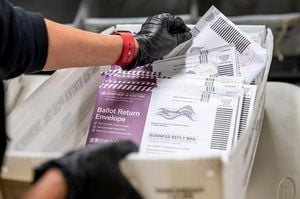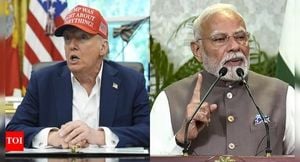In a striking display of bipartisan cooperation, two prominent members of Congress—Senator Jeanne Shaheen, the ranking Democrat on the Senate Foreign Relations Committee, and Republican Representative Joe Wilson of South Carolina—have announced a renewed push to permanently lift U.S. sanctions on Syria. Their announcement follows a recent visit to Damascus, where they met with Syria’s new president, Ahmed al-Sharaa, at the former palace of ousted leader Bashar al-Assad.
Their visit, which took place during the week of August 25–26, 2025, signals a significant shift in Washington’s approach to a country long isolated by U.S. policy. According to NPR, Shaheen and Wilson’s goal is straightforward: to give Syria’s new government a fighting chance to rebuild after years of devastating civil war. The lawmakers argue that lifting sanctions would unlock foreign investment and foster the kind of economic recovery that Syrians desperately need.
“The sanctions are preventing investment in the country and the prosperity and opportunity that people want to see in the future,” Senator Shaheen told reporters during a call from Beirut, as reported by Politico. She emphasized that the current restrictions are holding back not just economic growth, but also the hope of a more stable and unified Syria.
Their optimism is rooted in a personal meeting with President Ahmed al-Sharaa, a former jihadi fighter who rose to power after the dramatic ouster of Bashar al-Assad in December 2024. Shaheen described the palace where they met—once the seat of Assad’s rule—as “quite opulent on a huge hill overlooking the city.” She recounted how al-Sharaa, standing in his private office, shared his daily habit: “He says he gets up in the morning, and the first thing he does is look out over the city of Damascus, and the last thing he does at night is look out over the city of Damascus because he knows how much there is to do.”
For Congressman Wilson, the visit was deeply personal. “In fact, I had such an interest in Dictator Assad, last November, he identified me as an enemy of the state. So I was very happy that he fled to Moscow three weeks later,” Wilson recalled during the trip, according to NPR. Both lawmakers expressed that Syria now needs the world’s support, not continued isolation.
President Donald Trump, who remains a powerful figure in Republican politics, issued an executive order in June 2025 temporarily lifting the sanctions. But as Politico and NPR both point out, only congressional action can make this change permanent. Shaheen is now sponsoring legislation in the Senate to fully repeal the sanctions, with Wilson introducing a companion bill in the House. “We need to fulfill what President Donald Trump has said—give Syria a chance,” Wilson argued, echoing the former president’s own words.
However, the path forward is far from clear. Skeptics abound, both in the U.S. and in Israel, where trust in Syria’s new leadership remains low. The backdrop to the congressional visit includes deadly clashes in July 2025 between Syrian forces and the Druze minority in southern Syria, near the Israeli border. In response, Israel launched airstrikes that struck close to the Damascus palace where Shaheen and Wilson met al-Sharaa. Israel, which has long vowed to protect the Druze, remains wary of al-Sharaa, who as recently as August 2024 had a $10 million U.S. bounty on his head for past links to al-Qaida.
Shaheen herself acknowledged the complexities of the situation. “If I were to choose a president of Syria, it would be someone with experience in democracy,” she told NPR. “But that’s not where we are. Where we are is with a president who has overthrown a dictator that nobody thought was going to be able to be overthrown.” She added, “It’s a nascent central government. And I think it’s important for us to do everything we can to ensure that that government continues to move forward in a positive way. And I hope that Israel will be supportive of that as well.”
Shaheen’s remarks also touched on broader regional tensions. She was outspoken in her criticism of Israel’s ongoing military campaign in Gaza, particularly after an airstrike on a hospital killed five journalists. “I personally am appalled by the bombing in Gaza and by the killing of journalists. And I think it needs to end now,” Shaheen declared, as reported by Politico. Her comments reflect a growing chorus of Democratic voices in Congress who have become more critical of Israeli Prime Minister Benjamin Netanyahu’s handling of the war with Hamas.
The lawmakers’ advocacy for lifting sanctions is not without controversy on Capitol Hill. Many in Washington remain deeply uneasy about supporting a government led by a man with a history of jihadist fighting and alleged ties to extremist groups. Al-Sharaa’s past, especially the U.S. bounty for his links to al-Qaida, continues to cast a long shadow. Detractors argue that repealing sanctions could send the wrong signal about U.S. resolve against terrorism and human rights abuses.
Still, Shaheen and Wilson insist that the realities on the ground demand a new approach. The civil war that tore Syria apart for more than a decade may be over, but the country’s infrastructure is in ruins, and millions of Syrians remain displaced or impoverished. Without foreign investment and international support, they argue, the fragile peace could collapse and chaos could return.
According to NPR, Shaheen views the current moment as a chance for the U.S. to help ensure Syria remains a unified country. “It’s a government that needs help if Syria is to remain a unified country,” she said. The hope among proponents of lifting sanctions is that economic engagement will encourage moderation and stability in Damascus, rather than creating a vacuum that could be filled by more radical elements.
Meanwhile, Israel’s skepticism remains a major factor. The memory of recent violence and the proximity of Israeli airstrikes to the heart of the new Syrian government serve as a reminder of the region’s volatility. Israel’s leaders have repeatedly warned that they do not trust al-Sharaa, and that their security concerns—especially regarding the Druze minority and the risk of renewed extremist activity—must be taken seriously.
As Congress prepares to debate the proposed legislation, the stakes are high. The outcome will not only determine Syria’s prospects for recovery but also shape the wider Middle East’s trajectory in the years to come. For now, the bipartisan push by Shaheen and Wilson stands as a rare example of cross-party cooperation on foreign policy—one that could have profound consequences for a region still reeling from conflict.
Whether Congress ultimately votes to make Trump’s executive order permanent remains to be seen. But for the people of Syria, and for the lawmakers who visited Damascus, the hope is that a new chapter—however uncertain—may finally be beginning.





